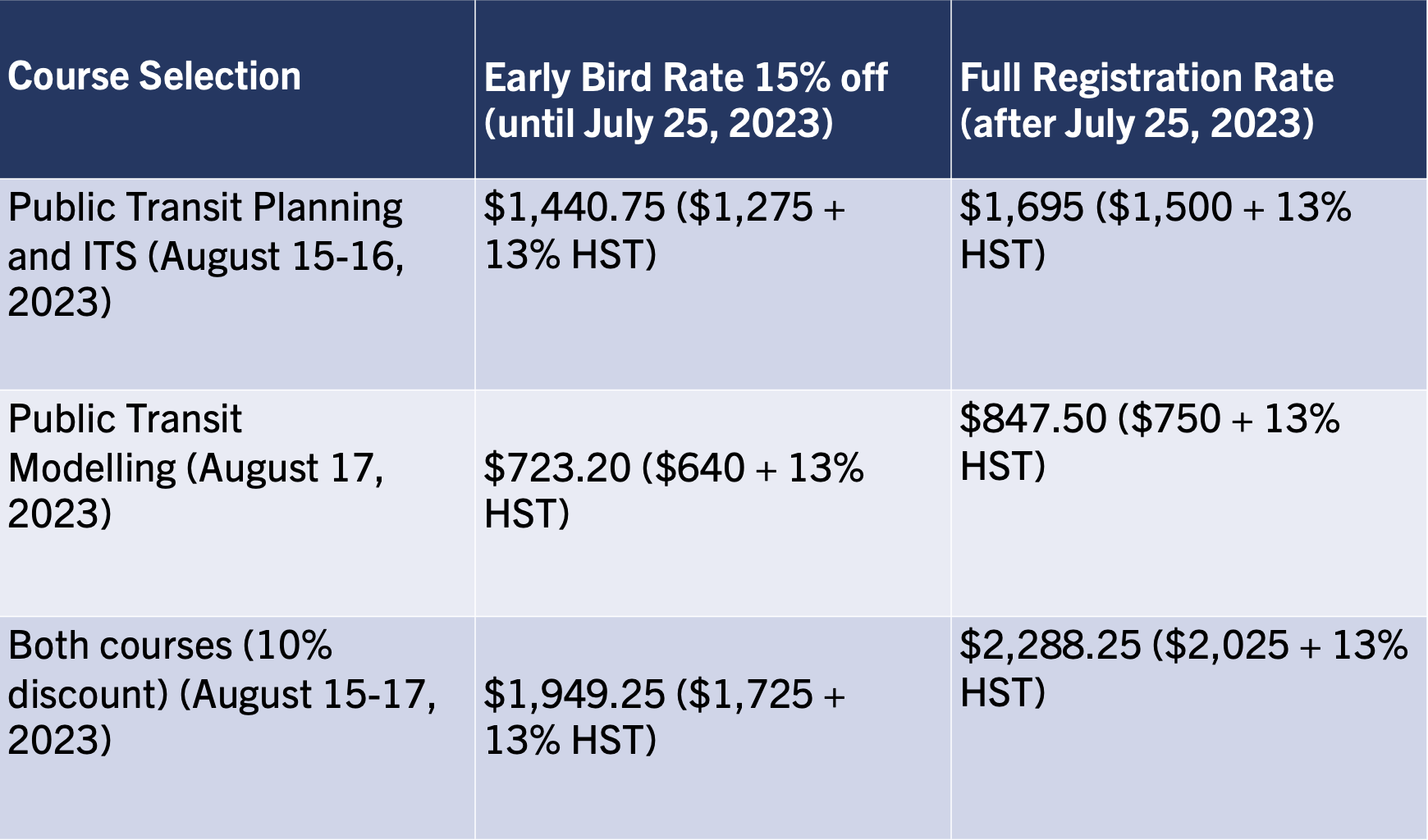iCity2 Project Launch
iCity2 will address Ontario's needs for improved sustainable, equitable mobility and affordable housing for residents of the GGH by focussing on crucial challenges facing cities today. Co-located at the University of Toronto and OCAD University, iCity2 draws on faculty expertise in transportation engineering, computer science, visual analytics, geographic information science, urban planning, economics, sociology, architecture, and design. It builds on the research products of decades of development of urban transportation simulation models, unprecedented access to data, computer-aided design, and knowledge of the GGH, our urban laboratory. iCity 2 is complemented by partnerships among academic researchers, mobility start-ups, technology firms, engineering, data and analytics firms, property developers, not-for-profits, and municipal and regional governments, creating an urban innovation ecosystem that ensures iCity 2.0 will achieve research impact with solutions that will be applied to improving mobility, sustainability, equity and affordability, regionally and globally.
Agenda
8:30 a.m. Registration and light breakfast available.
9:00 Welcome
Professor Eric Miller, Director, Mobility Network
9:10 Project Overview
Professor Eric Miller, Director, Mobility Network
- Overview, team and partners
- ORF funding requirements
- Project management approach
- Year 2 Work Plan and Goals
9:30 Emerging Mobility Technology and Services
Professor Steven Farber
- Current and emerging services
- Modelling services
- Field tests
10:10 Break
10:30 Building Complete Communities
Dr. Sara Diamond, President Emerita, OCAD University
Professor Eric Miller, Director, Mobility Network
- Scorecards
- Generative design
- Case studies
- Affordability analysis and modelling
11:30 Break
11:50 Integrated mobility networks
Professor Amer Shalaby, Director, Transit Analytics Lab
- Modelling travel markets and needs
- Generative design
- Tactical improvement strategies
12:30 p.m. Lunch
1:00 End of meeting
Invitation-only.
If any specific accommodations are needed, please contact mobilitynetwork@utoronto.ca. Requests should be made as early as possible.
On behalf of the University of Toronto’s Mobility Network, Urban Climate Action Project, and the Climate Positive Energy initiative, the SDGs@UofT Initiative, as well as the City of Toronto, I am pleased to invite you to attend a workshop focused on pathways to the adoption and implementation of low-carbon mobility. Titled Low-Carbon Mobility Workshop, this event is the first in a three-part workshop series designed to facilitate the exchange and mobilization of both practitioner and research knowledge in advancing the City's TransformTO Net Zero Strategy.
This workshop will focus on the challenges of and opportunities for meeting the TransformTO goal of having 75% of trips in Toronto under 5 km walked, biked, or taken by transit by 2030.
About the Workshop
Conversations at this event will explore: (i) potential policy frameworks that would serve as enablers towards sustainable low-carbon mobility; (ii) financing mechanisms to support strategic, technical and modelling studies, as well as implementation of their recommendations; (iii) successful initiatives and best practices towards decarbonisation of mobility from other jurisdictions from which to draw lessons and identify gaps and potential areas of future intervention; (iv) transportation and mobility planning for advancing the decarbonisation agenda, with an emphasis on urban land use, public-transport, urban to suburban connectivity, and active transportation considerations; and (v) opportunities to achieve community priorities and co-benefits (e.g., health, wellbeing, clean air, calm streets etc.) through sustainable low-carbon mobility solutions.
About the Series
In addition to convening and engaging diverse academic and non-academic actors in solutions-focused conversations, this workshop series will provide students involved with valuable skills and experience in interdisciplinary, community-based, equity-focused research and opportunities for professional development and networking in their field.
Accessibility Statement
We strive to host inclusive, accessible events that enable all individuals, including individuals with disabilities, to engage fully. To be respectful of those with allergies and environmental sensitivities, we ask that you please refrain from wearing strong fragrances. To request an accommodation or for inquiries about accessibility for this event, please contact Emily Smit, emily.smit@utoronto.ca.
This event is invitation only. If you would like to attend this event, please contact Kim Slater, kim.slater@utoronto.ca.
The Suburban Mobilities Cluster at the University of Toronto Scarborough is a multi-disciplinary research program that draws on expertise across nine disciplines to tackle four suburban mobility challenges: rising suburban inequalities, improving transportation design and technology, increasing transportation impacts on climate change, emerging stakes on resilience to shocks.
Suburban Mobilities is part of the Mobility Network, a network of partners, in the community, in industry, and in government, who will collaborate to find mobility solutions that serve people’s well-being, the planet’s future, and the potential of our growing cities to flourish equitably, sustainably and productively.
As a pillar of the GTA-RISE institute, the cluster will develop an integrated UTSC approach to collaborative research, while leveraging faculty resources and university institutions across the tri-campus, such as the Mobility Network, The School of Cities, and the University of Toronto Transportation Research Institute.
Agenda
9:30 a.m. Welcome and Land Acknowledgement
- Steven Farber, Associate Professor, Department of Human Geography, University of Toronto Scarborough. Director of Suburban Mobilities Cluster
9:40 Introduction: The cluster and the Scarborough Survey
- Ignacio Tiznado-Aitken, Postdoctoral fellow, Department of Human Geography, University of Toronto Scarborough, Research Coordinator of Suburban Mobilities Cluster
10:05 Predictors of Transportation-Related Barriers to Healthcare Access
- Nicholas Spence, Assistant Professor, Department of Health & Society, University of Toronto Scarborough
10:30 Active travel among older adults in suburban contexts: A mixed-methods approach
- Alec Khachatryan, PhD student, Department of Geography and Planning, University of Toronto
10:55 Coffee Break
11:10 15-minute city in Scarborough
- Anton Yu, Master student, Department of Human Geography, University of Toronto Scarborough
11:35 Relationships between accessibility and quality of life outcomes
- Joao Parga, PhD student, Department of Geography and Planning, University of Toronto
12:00 p.m. The way forward: Future research with the Scarborough Survey
- Shaila Jamal, Postdoctoral fellow, Department of Human Geography, University of Toronto Scarborough, Research Coordinator of Suburban Mobilities Cluster
12:25 Lunch and closing remarks
Download the Suburban Mobilities Cluster Day agenda.
Registration
Register on Eventbrite for this event.
Free. All are welcome.
If any specific accommodations are needed, please contact mobilitynetwork@utoronto.ca. Requests should be made as early as possible.
Back in 2013 it was estimated that congestion in the GTHA resulted in $11 million in annual lost productivity, and things haven’t improved. Toronto is the most congested city in Canada, and ranks as third most congested in North America. In 2022, average travel speeds during peak commute periods were 32 km/h, compared to 50 km/h in 2019; the average traveller lost 118 hours commuting.
How can Intelligent Transportation Systems and transit help us get more out of existing infrastructure to reduce congestion?
Speakers
Baher Abdulhai is a professor in the Department of Civil & Mineral Engineering at the University of Toronto. He has 33 years of experience in transportation systems engineering and Intelligent Transportation Systems (ITS).Prof. Baher Abdulhai has 33 years of experience in transportation systems engineering and Intelligent Transportation Systems (ITS).He is the founder and Director of the Toronto ITS Centre and the founder and co-Director of the Centre for Automated and Transformative Transportation Systems. Abdulhai received several awards. In 2014, he won the University of Toronto Inventor of the Year Award for MARLIN, an artificial intellegence-based, self-learning, self-collaborating adaptive signal control. Most recently, in 2021, he won the Ontario Professional Engineers Awards Engineering Medal for career Engineering Excellence.
Tim LaChapelle has over 28 years of software development leadership experience in multiple markets from Aircraft Communications, Medical Systems Instrumentation & Data Analysis, Global Internet Optimization, and many other big-data markets in commercial industry. In his last 12 years at PARSONS, Tim spent 10-years leading the technical execution in our National Security business segment, helping to drive innovation and completion of key strategic national cybersecurity initiatives, and especially the last two years helping to lead the digital transformation of PARSONS’ aviation, rail, transit, intelligent infrastructure, environmental, and energy businesses. As Chief Digital Officer at PARSONS, Tim continues to leverage his skills to push technical innovation and digital transformation across PARSONS’ federal and critical infrastructure businesses to ensure a more resilient and sustainable world for customers and his family (wife, Laura, and their four children) located near Baltimore, Maryand.
Amer Shalaby is Professor and Bahen/Tanenbaum Chair in Civil Engineering at the University of Toronto. He is the founding Director of the Transit Analytics Lab (TAL) and Co-Director of the Centre for Automated and Transformative Transportation Systems (CATTS). Dr. Shalaby is specialized in transit planning and scheduling, intelligent transit systems, transit operational management, transit system resilience, automated and connected transit technologies, and simulation and modelling of transportation systems. He has served on various technical committees and journal editorial boards. He also served on advisory panels of multiple transportation projects in Canada and internationally.
Moderator
Dr. Judy Farvolden is the founding managing director of Mobility Network at the University of Toronto. Prior to that, she was the founding executive director of the University of Toronto Transportation Research Institute. Through an extensive network of industry and government partners she identifies opportunities to apply the University of Toronto’s broad and deep transportation research expertise to realize a future of seamless, integrated mobility that enhances access and equity, and mitigates climate impacts. Dr. Farvolden serves on the board of the Canadian Urban Institute, the advisory board of the Urban Land Institute, Toronto Chapter, the Toronto Region Board of Trade’s Council on Goods Movement, the City of Vaughan’s Smart Cities Advisory Task Force and the editorial advisory board of Electric Autonomy Canada. Prior to joining UTTRI, Dr. Farvolden held senior management positions in several Toronto start-up companies and consulted on financial technology management. She holds advanced degrees in both engineering and planning: a PhD from Princeton University in transportation and operations research and a master’s degree in urban planning from the University of Toronto. She received a Certificate in Public Policy through Harvard Kennedy Executive Education in October 2021.
Register to attend
Register on Eventbrite for this virtual event.
Free. All are welcome.
If any specific accommodations are needed, please contact mobilitynetwork@utoronto.ca. Requests should be made as early as possible.
About The Way Forward
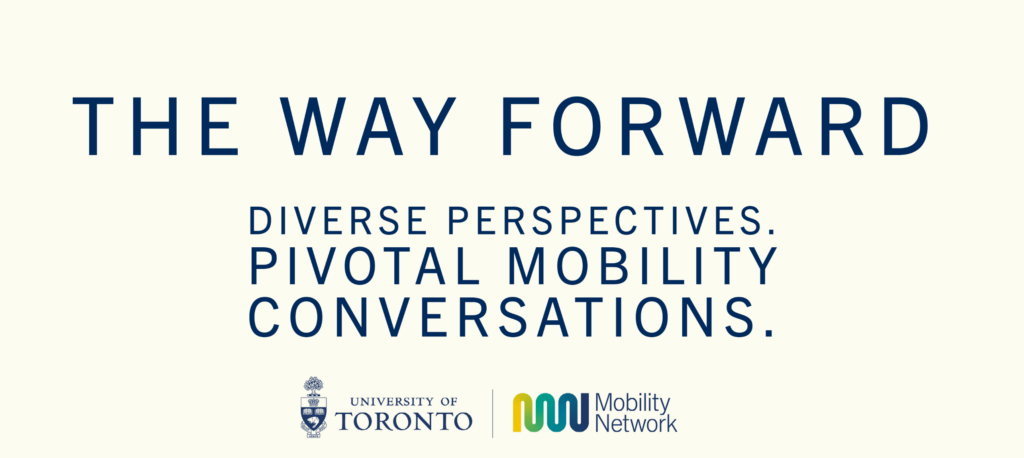
Explore the many ways mobility affects our lives at The Way Forward, a panel discussion series. Join the conversation!
All sessions take place online on Tuesdays from 4:00 p.m. to 5:00 p.m. and are free. Registration is required.
An introductory overview will be followed by short presentations, a moderated panel discussion, and audience Q & A. This event will be recorded and shared.
Interested in more The Way Forward sessions?
See the complete Spring 2023 schedule for The Way Forward.
Above: Professor Jinhua Zhao delivers Distinguished Lecture at Sidney Smith Hall, University of Toronto, March 27, 2023. (Photo: Pat Doherty).
Mobility Network was proud to co-host a visit by Professor Jinhua Zhao, the Edward and Joyce Linde Associate Professor of City and Transportation Planning at the Massachusetts Institute of Technology (MIT), on March 27 and 28, 2023. Prof. Zhao is well-known for his work at the MIT Mobility Initiative and as the host for the popular virtual weekly seminar series, MIT Mobility Forum.
Zhao came to Toronto to deliver the Distinguished Lecture for the Department of Civil and Mineral Engineering, "Behavior and computation: What defines the future of urban mobility?" the evening of March 27.
Though his visit was short, Zhao was generous with his time. In addition to delivering his public lecture and taking part in the subsequent panel discussion, Zhao met with several U of T faculty, made a guest appearance at Professor Eric Miller's graduate course "Cities as Complex Systems," and met with transportation engineering graduate students at a research roundtable.
The Distinguished Lecture event drew a large crowd.
In his welcoming remarks, Professor Brent Sleep, Chair of the Department of Civil and Mineral Engineering, said, "It's always great to see such a tremendous turnout for these Distinguished Lectures that are transportation-related. Every year I think transportation wins the prize for the widest and greatest and most number of people coming out from not just within the university, but from outside the university as well."
Professor Zhao captured audience attention from the start of his lecture.
I want to introduce a way of looking at transportation that I find rewarding.
Over time, throughout human history, we invented a fantastic set of technologies that help us move from point A to point B. Many from MIT and University of Toronto contributed to some of this design and implementation of the system.
But the question is, is the technology innovation necessarily translating into the betterment of the transportation and mobility system? That's the question I would ask.
Professor Jinhua Zhao, March 27, 2023
He explained his views in detail, drawing from research studies and sharing compelling arguments illustrated with relevant examples that always drove his points home.
Behaviour thinking is really good at identifying opportunities, while computational thinking is the one that offers the foundation, the solution to it. My research really tries to bring the two together. And you bring them together to shape individual behaviour, design systems, and reform policies.
Professor Jinhua Zhao, March 27, 2023
Following his lecture, Zhao joined Ryan Lanyon (TTC) and Professor Amer Shalaby (U of T) for a panel discussion moderated by Professor Marianne Hatzopoulou (U of T).
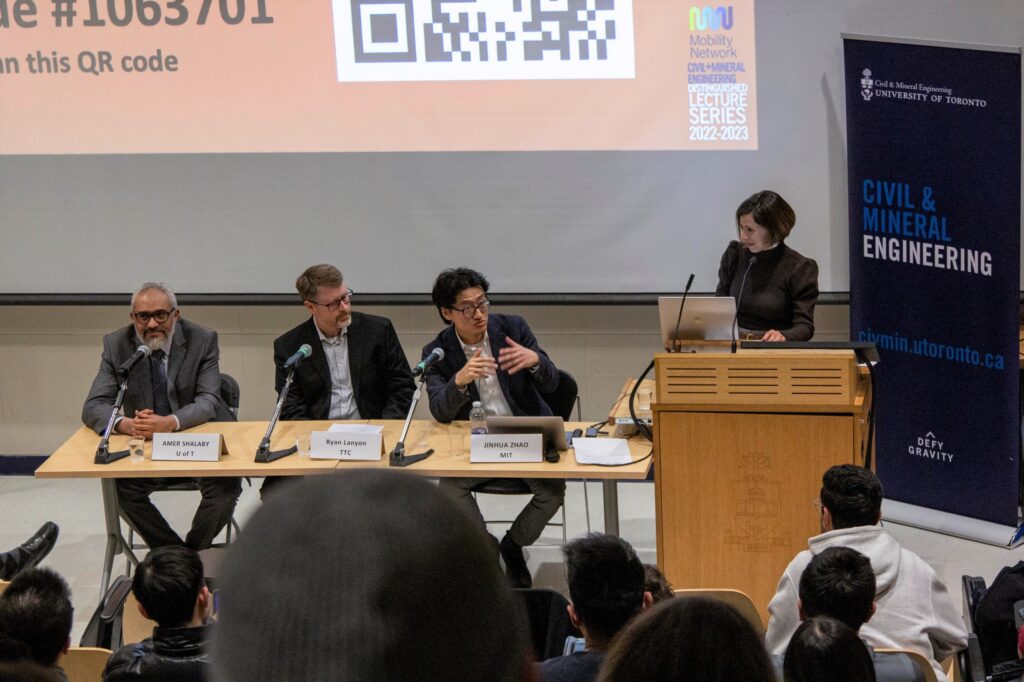
Prof. Hatzopoulou asked the panelists questions received from the audience and also blended in her own questions. Panel discussion topics ranged from a theoretical standard for basic access to mobility as a human right to the social nature of transportation.
Watch the video recording of "Behaviour and computation: What defines the future of urban mobility?"
Abstract
The transportation world is booming but in flux: the industry is being reshuffled, communities and cities are often confused and anxious about their mobility future, and the ecosystem pressure is daunting.
Mobility is in the midst of profound transformation with an unprecedented combination of new technologies: autonomy, electrification, connectivity, and AI, meeting new evolving priorities: decarbonization, public health, and social justice.
In this talk, Professor Zhao sharply focuses on two forces that drive the mobility future: behaviour and computation.
Behaviorally he investigates: Is travel social? Is travel emotional? And is travel perceptual? He uses a behavioural lens to examine mobility technologies and translates business decisions into a set of behavioural inquiries. Every single organization or company exists to change someone’s behaviour.
Computationally, he brings AI and machine learning methods to sense, predict, nudge and regulate travel behaviour. He demonstrates the power of bringing behavioural and computational thinking together, in order to make mobility services predictive, individualized, and experimental. He will illustrate how to design multimodal mobility systems that integrate shared and autonomous services with public transit.
Panel discussion to follow
Following his talk, Professor Zhao will be joined by Ryan Lanyon, Manager of New Technology and Innovation at the TTC, and Professor Amer Shalaby, Director of the Transit Analytics Lab, for a panel discussion moderated by Professor Marianne Hatzopoulou, Director of Positive Zero Transport Futures.
About Professor Jinhua Zhao

Jinhua Zhao is the Edward and Joyce Linde Associate Professor of City and Transportation Planning at the Massachusetts Institute of Technology (MIT). He integrates behavioral and computational thinking to decarbonize the global mobility system.
Prof. Zhao founded and directs the MIT Mobility Initiative, coalescing the Institute’s efforts on transportation research, education, entrepreneurship, and civic engagement. He hosts the MIT Mobility Forum, curating cutting-edge transportation research across the globe. Prof. Zhao directs the JTL Urban Mobility Lab and Transit Lab at MIT. He leads long-term collaborations with transportation authorities and operators worldwide, including London, Chicago, Washington DC, and Hong Kong and enables cross-culture learning between cities in North America, Asia and Europe. He develops methods to sense, predict, nudge, and regulate travel behavior, and designs multimodal mobility systems that integrate autonomous vehicles, shared mobility, and public transport. He is the co-founder and chief scientist for TRAM Global, a mobility decarbonization venture.
About the panel
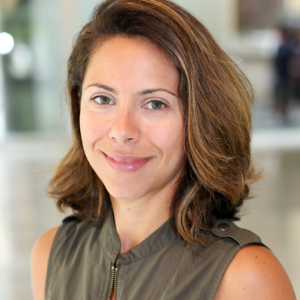
Marianne Hatzopoulou, moderator
Marianne Hatzopoulou is Professor in the Department of Civil and Mineral Engineering at the University of Toronto and Tier 1 Canada Research Chair in Transport Decarbonization and Air Quality. She leads the Transportation and Air Quality (TRAQ) research group studying the interactions between transportation, air quality, climate change, and public health; she published 150 publications on these topics. Prof. Hatzopoulou is also the Director of Positive Zero Transport Futures, a living lab ecosystem for testing transport decarbonization innovations with positive societal outcomes. Prof. Hatzopoulou is on the Canadian team of researchers who were the 2021 recipients of the NSERC Brockhouse Canada Prize for Interdisciplinary Research in Science and Engineering. In 2022, she received the University of Toronto Engineering Alumni Network 2T5 Mid-Career Achievement Award. She is an associate editor of the journal Transportation Research Part D: Transport and Environment and the incoming chair for the Transportation Research Board Standing Committee on “Air Quality and Greenhouse Gas Mitigation” (2023-2026).

Ryan Lanyon
Ryan Lanyon is the Manager of New Technology and Innovation at the TTC, having recently joined after a decade with the City of Toronto. Ryan has been working in local government for more than 20 years, starting out in demand management and providing online ridematching services to commuters. More recently, Ryan led the West Rouge Automated Shuttle Trial, developed the Transportation Innovation Zone at Exhibition Place, and recommended policies to City Council regarding micromobility. Ryan is also learning and researching methods of applying strategic foresight to prepare Toronto's transportation system for emerging and future transportation technologies.
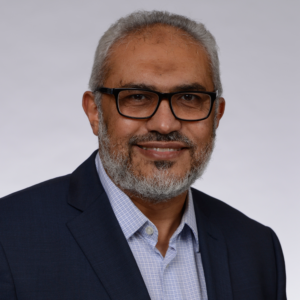
Amer Shalaby
Dr. Shalaby is Professor and Bahen/Tanenbaum Chair in Civil Engineering at the University of Toronto. He is the founding Director of the Transit Analytics Lab (TAL) and Co-Director of the Centre for Automated and Transformative Transportation Systems (CATTS). Dr. Shalaby is specialized in transit planning and scheduling, intelligent transit systems, transit operational management, transit system resilience, automated and connected transit technologies, and simulation and modelling of transportation systems. He has served on various technical committees and journal editorial boards. He also served on advisory panels of multiple transportation projects in Canada and internationally.
This free event was presented by the Department of Civil & Mineral Engineering Distinguished Lecture Series and co-sponsored by Mobility Network.
Our habits have changed. Most of us go to the office but not as often as we did before. Many of us have also changed the way we get there. Some of us took the opportunity to relocate when working from home became an option.
In the net, how does this change our demand for travel?
Speakers
Iain Dobson is Co-Founder of the Strategic Regional Research Alliance (SRRA). He has devoted the last 16 years of his career to policy innovation in infrastructure investment. He has served on the Board of Metrolinx, Transit Investment Strategy Advisory Panel, a member of the CivicAction Commercial Building Advisory Panel, and on the Expert Panel on the Sheppard Transit Corridor. From 2000, he developed a world class real estate data company and for 25 years prior to that was engaged in the commercial real estate development industry. Mr. Dobson has received numerous industry awards and has spoken at many of North Americas leading real estate associations, including NAIOP, SIOR, Canadian Land Economists, Real Estate Forums and has appeared on radio and TV programs such as Metro Morning and Cross Canada Check Up among others. Active in the community, he is currently a member on the advisory panel of LIGHTS, which is a unique program working in partnership with Community Living Toronto stimulate independent Living by those with intellectual challenges.
Khandker Nurul Habib is a civil engineering professor at the University of Toronto and a licensed Professional Engineer. His expertise is on strategic transportation planning, transportation data and modelling methodology.
Wendy L. Reuter, BA, MBA, is Head, Research & Analytics at Toronto Transit Commission (TTC).
Moderator
Professor Eric J. Miller (BASc, MASc University of Toronto; PhD Massachusetts Institute of Technology) has been a faculty member in the Department of Civil & Mineral Engineering, University of Toronto since 1983. He is currently Director of Mobility Network and Research Director of both the Data Management and Travel Modelling Groups. He is past-Chair of the US Transportation Research Board (TRB) Committee on Travel Behavior and Values and the International Association for Travel Behaviour Research (IATBR). He is a Member Emeritus of the TRB Transportation Demand Forecasting Committee. Among other awards, he is the recipient of the inaugural University of British Columbia Margolese National Design for Living Award (2012), the 2018 IATBR Lifetime Achievement Award, and the 2020 UofT Faculty of Applied Science and Engineering Safwat Zaky Research Leader Award.
Register to attend
Register on Eventbrite for this virtual event.
Free. All are welcome.
If any specific accommodations are needed, please contact mobilitynetwork@utoronto.ca. Requests should be made as early as possible.
About The Way Forward

Explore the many ways mobility affects our lives at The Way Forward, a panel discussion series. Join the conversation!
All sessions take place online on Tuesdays from 4:00 p.m. to 5:00 p.m. and are free. Registration is required.
An introductory overview will be followed by short presentations, a moderated panel discussion, and audience Q & A. This event will be recorded and shared.
Interested in more The Way Forward sessions?
See the complete Spring 2023 schedule for The Way Forward.
In this presentation, we present a method and empirical study for planning bike lane networks using data.
We first present an estimator for recovering unknown parameters of a traffic equilibrium model from features of a road network and observed vehicle flows, which we show asymptotically recovers ground-truth parameters as the network grows large. We then present a prescriptive model that recommends paths in a road network for bike lane construction while endogenizing cycling demand, driver route choice, and driving travel times. In an empirical study on the City of Chicago, we bring together data on the road and bike lane networks, vehicle flows, travel mode choices, bike share trips, driving and cycling routes, and taxi trips to estimate the impact of expanding Chicago's bike lane network. We estimate that adding 25 miles of bike lanes as prescribed by our model can lift ridership from 3.9% to 6.9%, with at most an 8% increase in driving times. We also find that three intuitive heuristics for bike lane planning can lead to lower ridership and worse congestion outcomes, which highlights the value of a holistic and data-driven approach to urban infrastructure planning.
About the speaker
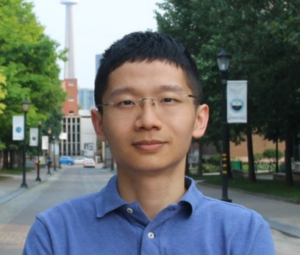
Sheng Liu is an Assistant Professor of Operations Management and Statistics at the Rotman School of Management. His research interests lie in supply chain and logistics, smart city operations (especially sustainable/climate-resilient system design), and data-driven decision-making (the integration of predictive and prescriptive analytics). His recent work explores the effective use of data to prescribe operational decisions for logistics and mobility systems. He received a PhD in Operations Research from UC Berkeley in 2019 and a BSc in Industrial Engineering from Tsinghua University in 2014. He has contributed to the development of advanced decision-making tools for leading companies, including Amazon, Lyft, JD.com, and CNPC.
* * *
Presented by University of Toronto ITE Student Chapter, UT-ITE. Free. All are welcome.
If any specific accommodations are needed, please contact ite@studentorg.utoronto.ca. Requests should be made as early as possible.
The Centre for Automated and Transformative Transportation Systems (CATTS) team at the University of Toronto invites you to their 6th annual symposium on July 6, 2023.

CATTS was established in 2017 with the purpose of quantifying and guiding the transformation of transportation systems in the era of rapid innovations in vehicular technologies and in provisioning of transportation as a service. CATTS is the first research centre of its kind in Canada to address the large-scale impacts of disruptive transportation technologies and services on our cities. It is a multi-disciplinary multi-sector collaboration that gathers academia, industry, technology experts, and the government. The centre’s mission is to guide societal transformation into a positive and sustainable direction, avoid the emergence of counterproductive travel trends, and emboldens Ontario cities as leaders in North America and the world.
Join us to learn about CATTS progress in its 6th year of research, and more.
The event will be hosted virtually and is free, but registration is required.
Agenda
9:00 a.m. Welcome and Opening Remarks, Professor Amer Shalaby
9:10-10:30 a.m. Session I - moderated by Dr. Toka S. Mostafa
Traffic Management and Control by Professor Baher Abdulhai
- Using AI-Based RM to Address Long Heavily Congested Freeways: A Case study on the QEW (Omar ElSamadisy)
- Headway Control for Autonomous Driving: A Case Study on the QEW (Lina Elmorshedy)
- Adaptive Traffic Signal Control: State-of-the-Art E-MARLIN Transformer (Xiaoyu Wang)
- SECRM: A safe, Efficient and Comfortable Automated Driving Model with RL (Tianyu Shi)
Public Transportation by Professor Amer Shalaby
- Advanced TSP (Wenxun Hu)
- Smart route management strategies (Kareem Othman)
- SPUR: Developing a Modular, Data-Driven Mesoscopic Simulation Platform to Analyze Stochastic Railway Networks (Peter Lai)
- Applications of generative AI to transit route management (Jiahao Wang)
10:30-11:00 a.m. Break
11:00 a.m. - 12:30 p.m. Session II - moderated by Dr. Toka S. Mostafa
Transportation Planning: Mobility as a Service (MaaS) by Professor Eric Miller
- Understanding the Dynamics of Vehicle for Hire Services in the Greater Toronto Area: A Comprehensive Study of Demand and Supply Patterns (Nael Alsaleh)
- Exploring Key Stakeholder Perceptions of Zero Occupant Vehicles (ZOVs)’s Impacts on Urban Areas (Lisa Losada Rojas)
Overview of AV and related MaaS Research by the Travel Demand Modelling Group (TDMG), Khandker Nurul Habib
- Modelling travel time perceptions towards autonomous vehicles in the GTHA (Felita Ong)
- Tracking Travel Demand Using Google Location History (Kaili Wang and Melvyn Li)
Transportation and Air Quality by Professor Marianne Hatzopoulou
- Implications of freight electrification scenarios for GHG emissions, air quality, health, and environmental justice (Sara Torbatian)
- Equity in the distribution of truck emissions in Toronto: Evidence from the past decade (Jad Zalzal)
Freight Modelling and Logistics by Professor Matthew Roorda
- Simulation of the performance of a person-following robot in crowded pedestrian environments (Farah Ghazzawy)
Computer Vision
- Computer Vision - Status update on North York Traffic Testbed (Kartikeya Bhargava)
12:30-1:30 p.m. Break
1:30-2:30 p.m. Guest Speakers' Session moderated by Dr. Toka S. Mostafa
1:30-2:00 p.m. "Insights on the Jacksonville Transportation Authority's Ultimate Urban Circulator Program," by Bernard Schmidt, Jacksonville Transportation Authority
2:00-2:30 p.m. "Combatting Escalating Congestion: What ITS and AI can do, cannot do, and what to expect," by Professor Baher Abdulhai
2:30-2:45 p.m. Closing remarks
Registration
Register on Eventbrite for this virtual event.
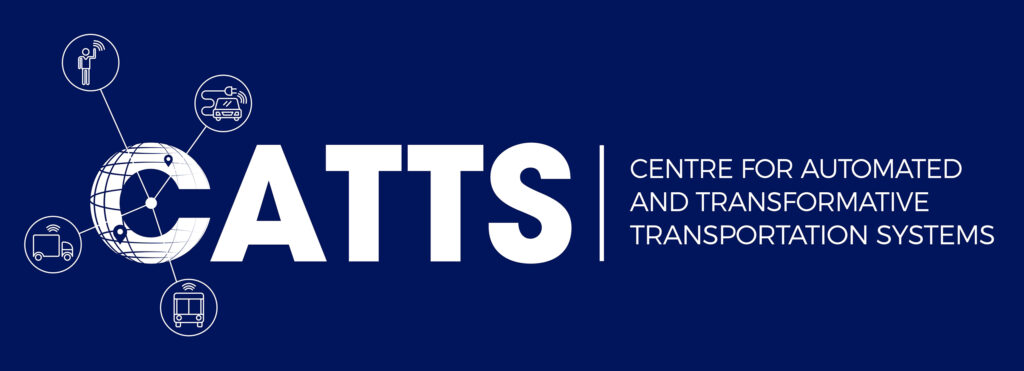
Download PDF of Public Transit Short Courses 2023 brochure
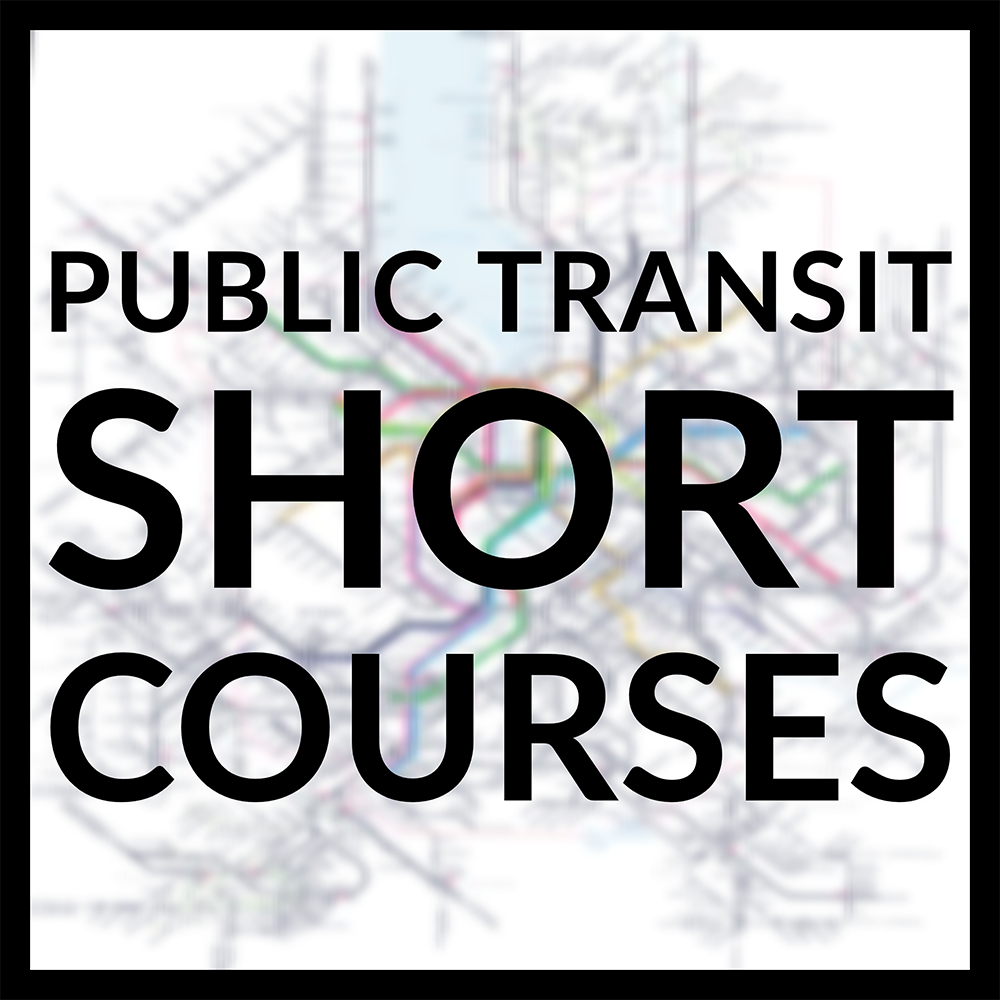
High quality public transit is the linchpin of liveable cities. Not only does it enhance mobility, accessibility, economic productivity, and help address climate change, but the COVID pandemic also illustrated its critical role in public health and ensuring the mobility of essential workers. Transit has always faced challenges in our auto-dominant society, but now faces an environment that is increasingly uncertain and turbulent. The last few years have highlighted the strategic importance of data, sophisticated analytics, and advanced technology such as Intelligent Transportation Systems (ITS), that enabled transit systems to respond more nimbly to the dynamic situation and the changing needs of customers. These tools are playing an increasingly critical role in the planning and operations of public transit, and need to be fully integrated into internal business processes.
The Transit Analytics Lab at the University of Toronto Mobility Network is offering two back-to-back courses designed to provide participants with knowledge on key concepts and best practices related to public transit service planning and technology. The first course, Public Transit Planning and ITS, provides an overview of key concepts and best practices related to transit planning, network and service design, service standards, transit and land use, and the application of ITS technologies. The second course, Public Transit Modelling, provides a complementary but more focused and advanced exploration of tools that can be used for forecasting demand at both the system and route levels, transit assignment, and microsimulation-based analysis. The courses will be taught by leading transit planning researchers and practitioners and will provide a balanced perspective on transit systems planning and ITS, including both state-of-the-art techniques and practical perspectives.
Course Outline
Who Should Attend?
The two short courses are designed for practising public transit professionals or those involved in the transportation and planning industry who have an interest in public transit planning and ITS. If you are new to the field and wish to have some formal exposure to the fundamentals, or if you have been practising for some time and wish to undertake a refresher and be exposed to recent state-of-the-art developments, then these short courses could form part of your professional development program.
It is expected that those involved in planning, designing and operating transit services at various levels of government will find value in the two courses. Consultants involved in traffic and public transit planning and ITS will also find the courses useful and relevant. Members of the general public with an interest in public transit are also invited to attend.
Course Organization
The two short courses are organized by the Transit Analytics Lab at the University of Toronto Mobility Network. The Mobility Network brings together experts from engineering, economics, policy, urban geography and planning and computer science. The network and its members are internationally renowned for high quality research in transportation from the perspectives of engineering, science and humanities.
Short Course Leaders
Dr. Hossam Abdelgawad has 18 years of experience in developing simulation models using a wide range of traffic software/ tools. He has ample experience in building models using AIMSUN, Paramics, UAF, Vissim, DynusT, HCS, Synchro, SimTraffic, EMME and Dynameq.
Brendon Hemily, PhD, is an independent consultant with 40 years of experience working with the transit industry in Canada and the US, and he serves as Senior Advisor for the Transit Analytics Lab. He has been involved in a wide range of projects related to the implementation of innovative service concepts and the effective use of advanced technology. Previously, he was Manager of Research and Technical Services at the Canadian Urban Transit Association where he worked for 15 years.
Professor Eric Miller is the director of the Mobility Network and a recognized expert in integrated land use transportation modelling and demand forecasting. He is the developer of GTAModel, a “best practice” regional travel demand modelling system used widely to forecast travel demand in the Greater Toronto Area. He is co-author of the textbook Urban Transportation Planning: A Decision-Oriented Approach.
Amer Shalaby is Bahen-Tanenbaum Professor in Civil Engineering and Founding Director of the Transit Analytics Lab at the University of Toronto, with 30 years of research and consulting experience in Canada and internationally in the areas of transit planning and intelligent transportation systems. His research has been published widely in peer-reviewed journals and international conference proceedings. He has served on various transit committees of the Transportation Research Board, and he sits on the editorial boards of multiple scientific journals.
Nigel Wilson is Emeritus Professor of Civil and Environmental Engineering at MIT focusing on urban public transport. He is Founding Director of the MIT Transit Lab, a major longterm collaborative research program with leading global public transport agencies including Transport for London (UK), MTR (Hong Kong) and the MBTA (US) which focuses on making better use of smart card and other automatically collected data to support decision-making throughout the agency. During sabbatical leaves from MIT, Professor Wilson worked in three large transit agencies, the MBTA, Metro Transit and TfL, and has served as consultant to a number of other North American transit authorities. He taught a short course in transit planning at MIT for twenty years which had a cumulative enrollment of over 400 transit professionals.
Fees
Acknowledgment
All amounts are in Canadian dollars. Registration covers attendance, course notes, lunches, coffee breaks and course completion certificate. Accommodation costs are not included in the registration fee. Upon receipt of your completed online registration form and payment, your registration will be acknowledged by email.
Registration Rates for 2023 Public Transit Short Courses
Notes
- All rates are HST inclusive in Canadian dollars.
- Early Bird rates, available until July 25, 2023, are discounted 15% from full registration rates.
- Registering for both courses is discounted 10%.
Register and pay online
Please complete two steps to register and pay for courses:
- Complete this registration form in full, and submit; and next
- After you submit your registration form, you will be re-directed to choose your course option and follow a link to a secure electronic payment site.
Location
Galbraith Building, Room GB202, 35 St. George Street.
Questions?
For inquiries about the course, please contact:
University of Toronto
35 St. George Street
The Transit Analytics Lab (TAL) of the University of Toronto brings together transportation and technology researchers from across the University of Toronto, transit systems in the Golden Horseshoe area, and private sector technology providers and consultants.
Among its objectives are to: foster innovation in transit data-driven tools (analytics) using advanced methods of data science, machine learning, artificial intelligence, simulation and statistics; expose the professional community through knowledge transfer activities to advanced analytics; build collaborations with public and private organizations; and establish U of T as a national and international leader in transit data analytics.
TAL was launched in 2020 with the International Symposium on Automated Transit Data. Since then, TAL has organized workshops and has been involved in a number of research pursuits, many of which have practical applications.
The time is appropriate to host our annual TAL Research Day workshop that will provide a high-level overview of the many research activities being pursued by the TAL team; please see the Draft Program below.
The TAL Research Day will be held virtually and is free, though registration is required.
Agenda
9:00 a.m. Introduction to the Transit Analytics Lab (TAL)
-
-
- Words of Welcome and Update on TAL Activities (Amer Shalaby)
-
9:15 Transit Analytics to Support Planning (Moderator: Brendon Hemily)
-
-
- Constructing Origin-Destination Demand Matrix using Wi-Fi and AFC Gate Count Data: A Case Study of Toronto’s Subway Network (Diego Da Silva)
- Trends in Toronto’s Transit Ridership Recovery: Insights from Subway Wi-Fi Records (Roger Chen)
- Modelling On-Demand Transit Ridership (Alaa Itani)
-
10:15 Break
10:30 Operations Analytics to Improve Rail Performance (Moderator: Amer Shalaby)
-
-
- Impact of Subway Service Disruption on User Mobility: Analysis and Visualization Using Customer Facing Wi-Fi Data in Toronto (Aidan Grenville)
- Short-term Prediction of Crowd Flows at Subway Stations using Wi-Fi Data and Graph Neural Networks Modelling (Diego Da Silva)
- Mitigating Subway Station Overcrowding via Passenger Inflow Control (Chandler White)
- SPUR: Modular, Data-Driven Mesoscopic Simulation Platform to Analyze Stochastic Railway Networks (Peter Lai)
-
11:30 Lunch Break
12:30 p.m. Keynote: A Conversation with John Levin on Transit Data and Analytics
- John Levin, Director-Strategic Initiatives, Metro Transit (Minneapolis)
1:30 Analytics to Support Bus Operations (Moderator: Brendon Hemily)
-
-
- Leveraging Large Language Models (LLMs) for Improving Public Transit Systems: An Exploration of GPT Models and State-of-the-Art Applications (Jiahao Wang)
- Extraboard Operator Planning and Scheduling Under Uncertainty (Jilin Song)
- Impacts of Transit Driver Advisory System with Space and Time Priorities on Route Performance (Kareem Othman)
-
2:30 Break
2:45 Analytics to Support Planning and Deployment of Zero Emission Buses (ZEBs (Moderator: Amer Shalaby)
-
-
- Insights from the Research on ZEB Deployment (Diego Da Silva)
- Optimization Model for Planning On-Route Charging Infrastructure and Schedules of ZEB Fleets (Lorna Licollari)
- Data-Driven Prediction of e-Bus Battery Consumption Rates using Machine Learning (Kareem Othman)
-
3:45 Wrap-Up
4:00 End of Research Day
Download the TAL 2023 Research Day agenda.
Registration
Register on Eventbrite for this virtual event.
Free. All are welcome.
If any specific accommodations are needed, please contact mobilitynetwork@utoronto.ca. Requests should be made as early as possible.
The Transit Analytics Lab (TAL) at Mobility Network hosted the virtual seminar "Improving safety and security in transit systems" by Jacqueline Darwood, Program Director, Transit Expansion at City of Toronto, on February 28, 2023.
TAL Director, Professor Amer Shalaby, welcomed attendees to the seminar, and introduced guest speaker Jacqueline Darwood.
Darwood's talk touched on improvements in station planning/design and rail operation and simulation; physical and cyber threats; and much more.
Transit customers rely on transit operators to provide reliable and safe day-to-day public transit services.
You might wonder why I start off by saying this.
Because we all want transit to be reliable, but if it's not safe, and you have either accidents which are deliberate or accidents because of a failure of the system, then, of course, the service breaks, and you're going to have either the absence of the service or delays in the service.
So it's from that standpoint that I tie safety with reliability.
Jacqueline Darwood, "Improving safety and security in transit systems," February 28, 2023.
Researchers at TAL have been working on many of the issues for some time and continue to actively explore how safety and security in transit systems may be improved for all.

After the seminar and before taking audience questions, Prof. Shalaby engaged Darwood in a brief discussion, observing that there is increased interest from industry in putting into practice some of TAL's research results and analysis.
"The industry is recognizing the benefit and the strength of such approaches, and [of putting] them to use in planning and operations management."
Professor Amer Shalaby
View Darwood's presentation deck
Watch the video recording of "Improving safety and security in transit systems"
Abstract
Safety and security in transit systems needs to be considered throughout the life cycle of the system. This therefore means that these considerations should be included at the:
- Planning phase
- Design phase
- Implementation/testing
- Operations/monitoring
Transit safety and security should be incorporated in all modes; however, my presentation will focus on rail with examples from the TTC Line 1 and the Ottawa Line Extension project. The presentation will look at design elements such as requirements for adequate vertical circulation and platform capacity. Additionally, I will also discuss the tools and technology currently available to simulate the operations based on design elements. I will also use the opportunity to examine the possible application of AI as a means of monitoring the system and the way forward to improving transit safety and security.
About the speaker

Jacqueline Darwood is an experienced transit and mobility professional with over 25 years' experience in transit operations/planning, infrastructure planning, project management and policy development. Over the course of her career, she has worked in both the public and private sectors across Canada. She has led and contributed to the planning and design of rapid transit and commuter lines in British Columbia and Ontario with major projects in Ottawa and the GTHA. Her work on several bus networks includes, the TTC Express Bus Network, the MiWay Transit Way, and the redesign of the bus network in the Kingston Metropolitan Region in Jamaica.
To her friends and family, she is known as the entertainer and personal shopper, always ready to host a BBQ, dinner, or a movie night, or simply get lost in the world of music.
About the Transit Analytics Lab (TAL)
The Transit Analytics Lab (TAL) of the University of Toronto was established in 2020 with University of Toronto funding from the Faculty of Applied Science & Engineering Dean’s Strategic Fund. It is headed by Professor Amer Shalaby, an expert in urban public transit.
TAL brings together:
- Transportation and technology researchers from across the University of Toronto;
- Transit systems in the Greater Toronto & Hamilton Area; and
- Private sector software providers.
TAL aims to undertake a wide range of activities including research and development, creation of a data analytics platform, workshops, an international symposium, education, and professional development training.
Positive Zero Transport Futures and Mobility Network will host the Emerging Mobility Scholars Conference June 22-23, 2023 at the University of Toronto.
We invite graduate students and postdoctoral fellows across Canadian institutions to join us in person at the University of Toronto to exchange ideas and showcase your research relative to mobility and climate change.
The conference theme is:
Cause or Solution? Urban mobility in an era of climate emergency
Due to socioeconomic shifts and the need to achieve deep cuts in greenhouse gas (GHG) emissions, Canada will experience an unprecedented transformation in urban infrastructures, policy responses, and new technologies.
Nowhere is this truer than in the transportation sector, which is one of Canada’s largest GHG emitters and has historically been relatively impervious to change due to its extreme dependency on fossil fuels.
This transformation in our mobility systems needs not only to mitigate climate change but also enable community benefits in an equitable manner. It is crucial that efforts to decarbonize our urban areas be informed by the co-benefits of GHG reduction.
Conference topics
- Co-benefits of decarbonization
- Land use and transportation planning
- Technological response to climate change
- Equity and environmental justice
- Transportation and health
- Urban resilience planning
- Planning and politics of climate change
- Air pollution in a changing climate
- Climate extremes: Data and modelling
Call for Abstracts
- Abstracts to be 300 words or less.
- All abstracts must be submitted by March 10, 2023.
- Submit your abstract through the submission web portal or this QR code:

